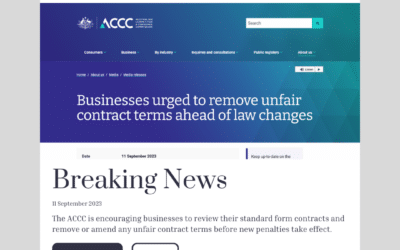
Force Majeure and Coronavirus (COVID-19) a global pandemic and the protective measures being taken by business, government and the nations across the globe.
In this article we focus on the legal impacts in Australian business contracts as a result of the Coronavirus (COVID-19), in particular, we explain the significance of the legal principle of force majeure and shed some light into the ways the law might work in regards to your business contract or contracts which you might currently be negotiating for your business.
When Is A Contract Actually Formed?
Contract law is a fundamental legal principle. A legally binding contract needs to meet the following elements, and only then can a contract be a contract:
- There must be an offer made from one party to the other;[1]
- The offer must be accepted;[2]
- The parties in self must intend to be in a legally binding relationship. This is often termed “intention to create legal relations”;[3]
- There must be a consideration, meaning something payable or paid as the price under the contract. [4]
The interesting thing about contracts is that they can be either verbal or written. In fact, a contract may even be implied by conduct and even by other forms of communication.
Contracts made by email communication are a particularly relevant consideration given today’s prevalent choice in so far as we see it as Contract Lawyers.
What Does Having Contract Actually Mean In Law?
A contract is legally binding and it is very useful to have a contract in your commercial dealings, also so that your business can be clear on what it’s contract rights and obligations are in a particular situation or business deal.
Also, contracts are legally binding so it means a contract can give you and your business a level of understanding and certainty about the legal rights and legal obligations.
Once a contract has been formed it gives the parties to the contract the peace of mind in knowing that there is a legal enforceable document in place. The contract in place is intended to give the parties the proper understanding of the legal obligations and rights of they have in the contract or agreement reached.
If we were to look at fully written express contracts, we could imagine standard clauses in a contract which will be contained in those documents. For example, most recent contracts include provisions about the parties to the contract the consideration, timing requirements, express setting out of the elements of the contract … plus more.
One such provision contained in many contracts is the “Force Majeure” provision.
What Does Force Majeure Mean In Contract?
Given particular contract and business experience, the aim is to assist in giving you an understanding of the contract requirements and scope of force majeure contract clauses insofar as your business might be concerned. On this basis, it is important for you to understand what force majeure means when in a contract clause.
A Force Majeure clause contained in a contract is intended to alleviate the parties obligations under the contract when certain events or catastrophes occur.
An example of a Force Majeure clause could be:
“The parties under this contract, either jointly or severally, are not liable for any loss, claim or damage where such loss, claim or damage arises directly as a result of the other parties’ breach of this contract in so far as that breach is an immediate result of Force Majure.”
Of course, there are many variations in the way a force majeure contract clause might actually be written into the contract.
The legal principles around force majeure grew out of the legal concepts regarding contract frustration.[5] Some examples where frustration has been deemed to have occurred include where there has been physical destruction of the actual object underneath the contract, where an event didn’t occur which needed to enable to contract, where the law has changed and of course there are others.[6]
What Is The Impact of Force Majeure In A Contract?
Perhaps some lawyers consider the force majeure contract provision is the most helpful for those seeking to get out of a contract impacting Australian business in the midst of the coronavirus.
The important thing to remember though is that a force majeure contract provision might allow a party to in effect get out of the contract, in circumstances where it would otherwise constitute a breach of the contract and then due to the contract breach there might not be any legal or contract remedy.
How Does Force Majeure Operate In A Contract Given The Coronavirus?
There obviously has never been any Australian court decision about a contract being the subject of force majeure in an Australian business context, especially because the impacts experienced now due to the Coronavirus (COVID-19) have never been experienced before.
The impacts of force majeure and coronavirus into Australian business contracts is a new period in our Australian legal and community history. The coronavirus is now considered a health pandemic on a global level.
Further, impacts resulting from health crisis are not normally covered by force majeure when a contract is interpreted because force majeure is generally where there is an unforeseen consequence, normally termed an “act of God”.
On this basis, the Coronavirus (COVID-19) is unlikely to impact an Australian business contract to allow the contract to be exited without breach unless the definition of force majeure as defined in that contract actually allow for it by way of inclusion into the definition and operation into the contract clause itself.
How To Enforce A Contract If The Other Person Is Breaking The Contract?
Contracts generally define what is meant by force majeure when there is a force majeure clause in the contract. If the Coronavirus (COVID-19) is not included in the definition of force majeure, or if the contract doesn’t have a force majeure clause, then it is likely the contract can be enforced. Normally as business and contract lawyers, we would expect this to be the case generally in most contracts but you should get specific legal advice for your situation.
What if You Are Entering Into A Contract And You Want To Minimise Coronavirus Impacts?
If entering into a new contract perhaps you can consider defining the term “force majeure” to include Coronavirus, for example, to extend the term to our current concerns if you want that level of legal protection in your contract.
What Are The Key Take Away Impact Points For Coronavirus (COVID-19) And Australian Business Contracts?
The hope is you find this article useful in so far as coronavirus and force majeure are both likely to impact business contracts and from a legal standpoint.
Remember:
- Force majeure is normally limited to things like natural disasters ie earthquake, flood and other things like war, riots, government large scale problems;
- Coronavirus (COVID-19) is a new pandemic on a global basis;
- It is important to get legal advice for your contract and to understand your legal position.
In this article, light shines upon force majeure as a contract principle and the impacts into Australian business contracts based on contract knowledge Australia wide.
Business and commercial enterprise globally have all been affected by coronavirus (COVID-19). COVID-19 is affecting more than just business and we appreciate the loss people are experiencing in many ways beyond contract law. Hopefully, you find this article useful for your contract, your business and your legal situation, especially during this current coronavirus (COVID-19) pandemic.
If you have any queries concerning a potential defamation matter, contact us as Contract Lawyers Melbourne may be able to help in addressing those concerns.
Important disclaimer: The material contained in this publication is of a general nature only and it is not, nor is intended to be legal advice. This publication is based on the law as it was prior to the date of your reading of it. If you wish to take any action based on the content of this publication, we recommend that you seek professional legal advice.
[1] Empirnall Holdings Pty Ltd v Machon Paull Partners Pty Ltd Court of Appeal (NSW) (1988) 14 NSWLR 527; https://www.australiancontractlaw.com/contractlaw/formation-agreement.html
[2] Felthouse v Bindley (1862) 142 ER 1037; https://www.australiancontractlaw.com/cases/felthouse.html
[3] Masters v Cameron(1954) 91 CLR 353; http://classic.austlii.edu.au/au/journals/AdelLawRw/1970/1.pdf
[4] Roscorla v Thomas (1842) 3 QB 234; https://www.australiancontractlaw.com/cases/roscorla.html
[5] Philip McNamara, Force Majeure clauses,http://www.austlii.edu.au/au/journals/AUMPLawAYbk/1992/26.pdf
[6] Leigh Ellis, Frustration of Contracts in law: Getting out of Contract Obligations (Termination of Contracts) updated 24 June 2019 https://hallellis.co.uk/frustration-legal-contracts/

Book Your Appointment
Related Articles
Privilege Under Pressure: Insights from the Optus Case
A Shifting Legal Landscape Today's businesses are under constant threat from cyber attacks, making it increasingly important to understand how they can legally protect their private conversations. Legal professional privilege is a fundamental rule that keeps the...
Ticketek’s $500K Fine: A Legal Perspective on Email Compliance
In the constantly changing world of digital communication, email marketing remains a vital way for businesses to connect with their audience. However, it's crucial to manage this tool with care and attention to legal obligations. The Australian Communications and...
Navigating the Waters of Unfair Contract Terms in Australia
As a small business owner in Australia, you might have come across the recent updates to the Australian Consumer Law regarding unfair contract terms. If it seems a bit complex, don't worry! We're here to simplify it for you in clear terms. Unfair Contract...




